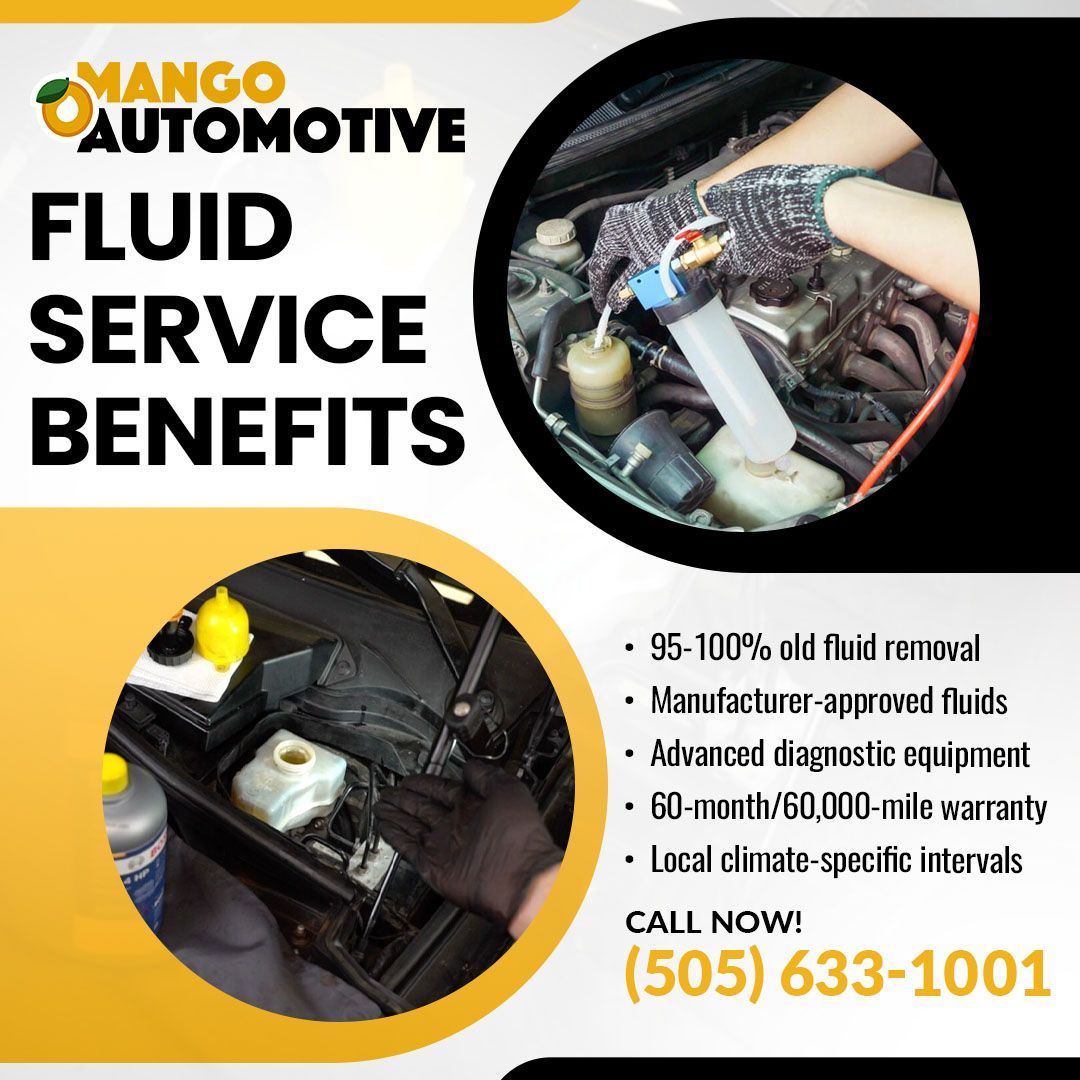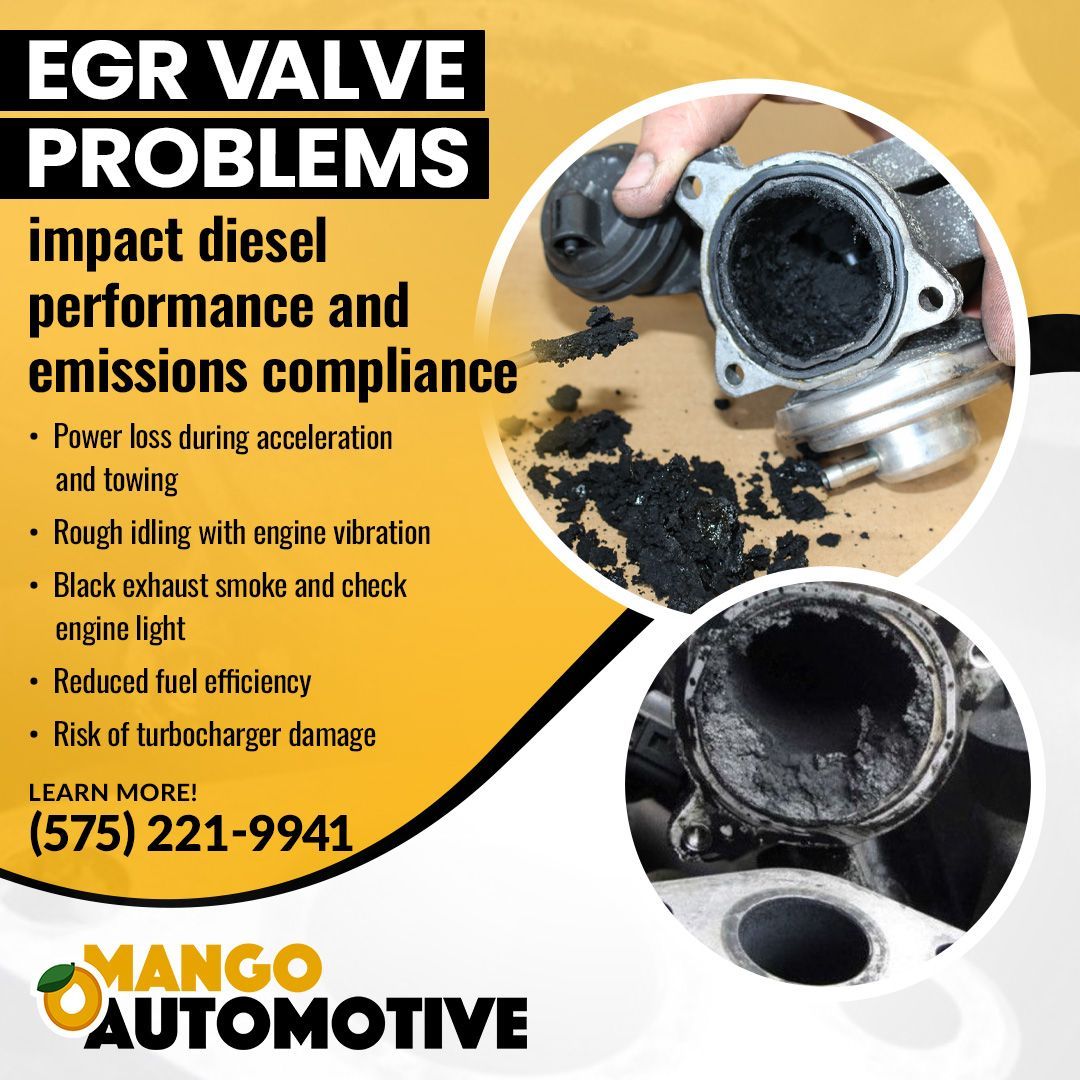How Often to Change Power Steering & Transmission Fluid: Tips from the Top Mechanics in Eagle Ranch
Power steering and transmission fluids require regular topping off and periodic replacement to maintain vehicle performance and prevent expensive repairs. Albuquerque's extreme temperatures and stop-and-go traffic accelerate fluid breakdown, making consistent maintenance schedules important for local drivers.
At
Mango Automotive, our experienced
auto mechanics in Albuquerque understand how desert climate and high-altitude conditions affect your vehicle's fluid systems. Since opening our doors in 2021, we've helped Eagle Ranch residents and drivers throughout the region maintain reliable vehicle performance through proper maintenance and repairs.

Why Regular Fluid Maintenance Matters
Proper fluid maintenance prevents 90% of power steering and transmission failures. Power steering and transmission systems depend on clean, properly functioning fluids to operate safely and efficiently. Without regular maintenance, these fluids degrade and cause expensive component damage.
Preventing Catastrophic System Failures
Contaminated fluids create a cascade of problems that lead to complete system failure. Metal particles from normal wear circulate through the system, causing accelerated damage to pumps, valves, and seals.
Power steering pump replacement and transmission rebuilds cost thousands of dollars, depending on vehicle type. Regular fluid maintenance prevents these major expenses at a fraction of the replacement cost.
Failed power steering affects vehicle safety during emergency maneuvers. Loss of steering assist makes parking lot navigation difficult and highway lane changes dangerous, particularly for elderly drivers or those with limited upper body strength.
Extending Component Life Expectancy
Clean fluids lubricate moving parts and remove heat from high-stress components. Fresh fluid maintains proper viscosity across temperature ranges and protects seals from hardening and cracking.
Regular transmission fluid changes and maintenance in accordance with manufacturer recommendations can help well-maintained automatic transmissions achieve lifespans of 150,000 to 200,000 miles or more, though longevity can vary depending on vehicle type, driving conditions, and service practices.
Transmission systems with severely degraded or contaminated fluid may experience premature failure, often within 75,000 to 100,000 miles, due to increased wear, overheating, and inadequate lubrication.
Economic Benefits of Preventive Care
Preventive maintenance costs significantly less than emergency repairs. Scheduling regular fluid service with your trusted mechanic in Eagle Ranch avoids costly towing and urgent repair situations.
Emergency repairs during peak summer months often require premium labor rates due to increased demand. Planning maintenance during moderate weather periods saves money and reduces service delays.
Maintained vehicles retain higher resale values. Documented fluid service records demonstrate proper care to potential buyers, increasing trade-in values compared to vehicles without maintenance documentation.
Power Steering Fluid Maintenance Intervals
Power steering fluid needs to be topped off every 30,000 to 60,000 miles or every 2 to 4 years, depending on vehicle type, driving conditions, and manufacturer guidelines.
Power steering systems operate under extreme pressure to reduce steering effort. The system generates up to 1,600 pounds per square inch (PSI) of hydraulic pressure. This high-pressure environment breaks down fluid properties over time.
Fresh power steering fluid appears clear to light amber in color. Dark brown or black fluid indicates contamination and immediate replacement needs. Contaminated fluid contains metal particles and degraded additives that damage system components.
How Temperature Affects Power Steering Fluid
Albuquerque's summer temperatures exceed 100°F regularly. High heat causes power steering fluid to thin and lose viscosity. Thin fluid provides less lubrication and allows increased wear on pump components.
Cold weather has the opposite effect. Winter temperatures make fluid thicker and harder to circulate. Thick fluid increases pump workload and reduces steering responsiveness during startup.
Temperature cycling between hot summers and cold winters accelerates fluid breakdown. Repeated heating and cooling break down chemical additives that protect seals and prevent foaming.
Signs Your Power Steering Fluid Needs Attention
Several symptoms indicate power steering fluid problems:
Steering Effort Changes:
Increased effort required for parking lot maneuvers, or low-speed turns, signals low fluid levels, or degraded fluid quality.
Unusual Noises:
Whining, groaning, or squealing sounds when turning the wheel indicate air in the system or insufficient lubrication.
Fluid Leaks:
Pink or amber fluid puddles under the front of your vehicle suggest seal failure or loose connections.
Foamy Appearance:
Bubbles in the reservoir indicate air contamination, often caused by low fluid levels or damaged seals.
If you notice any of these symptoms, your
mechanic in Albuquerque can diagnose the problem and recommend appropriate service intervals based on your specific driving conditions.
Transmission Fluid Service Schedules
Automatic transmission fluid requires checking every 30,000 miles and complete replacement every 60,000-100,000 miles. Manual transmissions need service every 30,000-60,000 miles. Transmission fluid serves multiple functions in your vehicle. It lubricates moving parts, transfers hydraulic pressure for gear changes, and removes heat from internal components. These demanding conditions cause gradual fluid degradation.
Automatic transmissions generate more heat than manual transmissions. Heat accelerates chemical breakdown and creates contamination from clutch material wear. This explains why automatic transmissions need more frequent service.
Severe Service Conditions
Albuquerque driving conditions often qualify as severe service. Under such conditions, reduce maintenance intervals. Severe service conditions include:
Stop-and-Go Traffic:
Daily commuting on I-40 and I-25 creates frequent acceleration and deceleration cycles that stress transmission systems.
Temperature Extremes:
Summer temperatures above 95°F accelerate fluid breakdown. The National Weather Service reports Albuquerque averages
67 days above 90°F annually.
Short Trip Patterns: Trips under 10 miles prevent transmissions from reaching ideal operating temperature, causing moisture accumulation.
Dusty Conditions:
Desert environments introduce contaminants through breather systems and worn seals.
CVT Transmission Requirements
Continuously Variable Transmissions (CVT) require specific maintenance schedules. CVT systems use steel belts and pulleys instead of traditional gears. This design creates unique lubrication and cooling demands. Most manufacturers recommend CVT fluid replacement every 30,000-60,000 miles. Some brands specify service as frequently as every 30,000 miles under normal conditions.
CVT fluid cannot be substituted with regular automatic transmission fluid (ATF). Using incorrect fluid causes belt slippage and expensive damage. Always verify the exact specification in your owner's manual, or consult with your
mechanic in Eagle Ranch to determine the correct fluid type for your vehicle.
Regional Maintenance Considerations
Albuquerque's high altitude and desert climate require more frequent maintenance intervals than coastal regions. Local environmental factors affect fluid performance and service requirements. Understanding these factors helps optimize maintenance schedules.
Altitude Effects on Vehicle Systems
Albuquerque sits at 5,312 feet above sea level. High altitude creates lower atmospheric pressure that affects fluid circulation and cooling systems. Reduced air density decreases cooling efficiency in radiators and transmission coolers. Less efficient cooling increases operating temperatures and accelerates fluid breakdown. Lower atmospheric pressure also affects sealed system venting. Pressure differentials can cause seal leaks and contamination issues not common at sea level.
Dust and Contamination Sources
Desert environments expose vehicles to fine particles that enter systems through breather caps and worn seals. Contaminated fluid accelerates wear and reduces performance. Dust particles are abrasive to metal surfaces. These particles circulate with fluid and cause accelerated wear. To prevent dust from entering the fluids, replace breather caps and inspect seals regularly. Professional service includes contamination assessment and cleaning procedures.
Seasonal Temperature Variations
New Mexico experiences temperature swings from below freezing to over 100°F. This temperature range stresses fluid chemistry and system components. Winter temperatures affect fluid viscosity and circulation. Summer heat accelerates chemical breakdown and increases cooling system demands. Spring and fall temperature transitions cause thermal cycling that breaks down fluid additives and stresses seals through expansion and contraction.
Experienced mechanics in Albuquerque, like Mango Automotive, understand these local factors and adjust service recommendations accordingly.
Warning Signs Requiring Immediate Attention
Any fluid leak, unusual noise, or performance change requires professional inspection within 100 miles of the first occurrence. Recognizing early warning signs prevents minor problems from becoming expensive repairs.
Power Steering System Warnings
Power steering problems affect vehicle control and safety. These symptoms require prompt professional attention from your mechanic in Albuquerque:
Sudden Steering Effort Increase:
Immediate loss of power assist indicates pump failure or severe fluid loss. Stop driving and check fluid levels immediately.
Grinding or Squealing Noises: Metal-on-metal sounds indicate insufficient lubrication or component failure. Continued operation causes expensive damage.
Fluid Leaks:
Any fluid loss reduces system performance and indicates seal failure. Small leaks worsen rapidly under system pressure.
Transmission Performance Changes
Transmission problems often develop gradually but can fail suddenly. Early intervention prevents complete failure:
Delayed Engagement:
Hesitation when shifting from park to drive or reverse indicates low fluid pressure or internal wear.
Hard or Erratic Shifting: Abrupt gear changes or inconsistent shift points suggest contaminated fluid or control system problems.
Slipping Sensations:
Engine RPM increase without corresponding acceleration indicates clutch or band failure requiring immediate service.
Overheating Symptoms: Burnt smell, smoking, or temperature warning lights indicate severe internal problems requiring immediate shutdown.
Professional Diagnostic Value
Experienced technicians identify problem causes and recommend appropriate repairs. Early diagnosis prevents minor issues from causing major failures. Diagnostic equipment measures system pressures, temperatures, and flow rates. This data reveals problems invisible to visual inspection alone.
Professional Fluid Maintenance at Mango Automotive
Mango Automotive provides Eagle Ranch residents with expert fluid maintenance services backed by a 60-month/60,000-mile warranty. We understand the unique maintenance challenges local drivers face, and our fluid maintenance services are designed for high-altitude desert driving conditions.
Specialized Equipment and Procedures
We use professional-grade fluid exchange equipment that removes 95-100% of contaminated fluid from your vehicle's systems. Our fluid exchange process includes complete system flushing, filter replacement when accessible, and pressure testing to verify proper operation. This thorough approach prevents premature component failure and extends system life.
Our mechanics in Eagle Ranch use modern diagnostic equipment to test fluid condition, measure system pressures, and identify potential problems before they cause expensive damage. Early detection saves money and prevents unexpected breakdowns.
Quality Fluids and Parts
We stock manufacturer-approved fluids for all vehicle makes and models. Using correct fluid specifications protects your vehicle's systems and maintains warranty coverage. Our inventory includes conventional ATF, synthetic fluids, CVT-specific formulations, and dedicated power steering fluids. Each fluid type meets or exceeds original equipment manufacturer specifications.
All filters and gaskets used in our services come from reputable suppliers and meet OEM quality standards. Quality components last longer and provide better protection than generic alternatives.
Local Expertise and Understanding
Our auto mechanics in Albuquerque have extensive experience with desert climate maintenance requirements. We adjust service intervals based on local driving conditions, altitude effects, and seasonal temperature variations. Our maintenance schedules account for the harsh summer conditions and recommend service intervals that prevent heat-related damage.
Stop-and-go traffic also creates severe service conditions for many local commuters. We understand these patterns and recommend maintenance schedules that protect your investment.
Warranty Coverage and Protection
Our industry-leading warranty provides 60 months or 60,000 miles of coverage on fluid maintenance services. This includes 36 months/36,000 miles of nationwide coverage plus an additional 24 months/24,000 miles exclusively at Mango Automotive locations. Parts warranties follow manufacturer policies, providing additional protection for component failures.
Frequently Asked Questions
How do I know when my power steering fluid needs changing?
Dark brown or black fluid color indicates immediate replacement needs, regardless of mileage. Fresh power steering fluid appears clear to light amber. Other warning signs include increased steering effort, whining noises when turning, and fluid leaks under the vehicle.
Can I mix different types of transmission fluid?
Never mix different transmission fluid types, as this causes seal damage and performance problems. Each fluid type contains specific additives designed for particular transmission systems. Using incorrect fluid voids warranty coverage and cause expensive damage.
How long can I drive with low power steering fluid?
Stop driving immediately if the power steering fluid is below the minimum line to prevent pump damage. Low fluid levels cause pump cavitation and rapid internal damage.
What's the difference between a transmission fluid change and a flush?
Fluid changes replace 30-40% of old fluid, while professional flushes replace 95-100% of contaminated fluid. Standard drain-and-fill only removes pan fluid. Professional flush equipment circulates new fluid through the entire system, including cooler lines and valve bodies.
At Mango Automotive, our experienced auto mechanics in Albuquerque can help answer all your fluid maintenance questions and provide professional services tailored to your vehicle's specific needs. We use advanced diagnostic equipment to assess fluid condition, recommend appropriate service intervals, and perform complete system maintenance that keeps your vehicle running reliably.

Expert Fluid Maintenance from Your Trusted Mechanic in Eagle Ranch
Regular power steering and transmission fluid maintenance prevents expensive repairs and maintains vehicle safety. Following proper service intervals adapted to local driving conditions protects your investment.
Professional fluid service provides superior protection compared to basic maintenance procedures. Complete system inspection, quality fluids, and experienced technicians deliver results that extend vehicle life.
For expert fluid maintenance services from the most trusted mechanic in Albuquerque, contact Mango Automotive today at
(505) 633-1001. Our team provides professional service tailored to local driving conditions and your vehicle's specific requirements.














